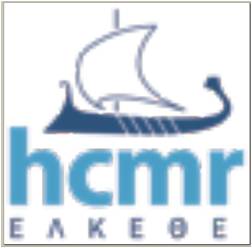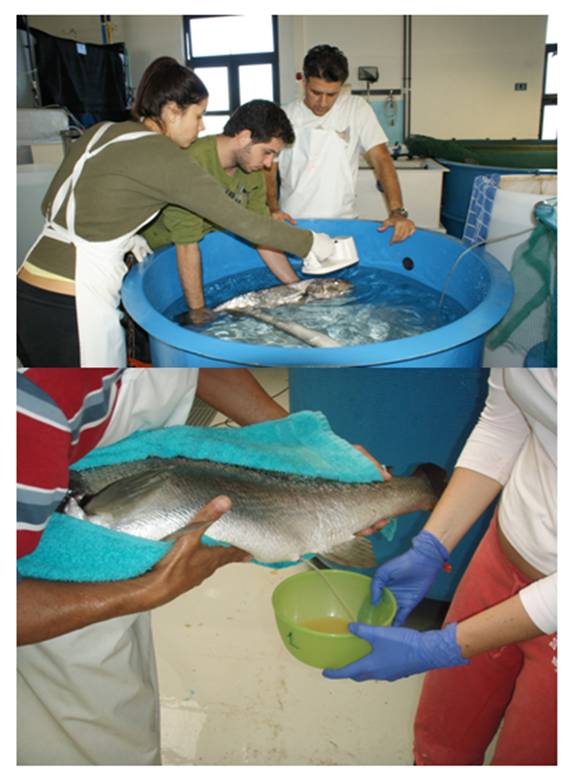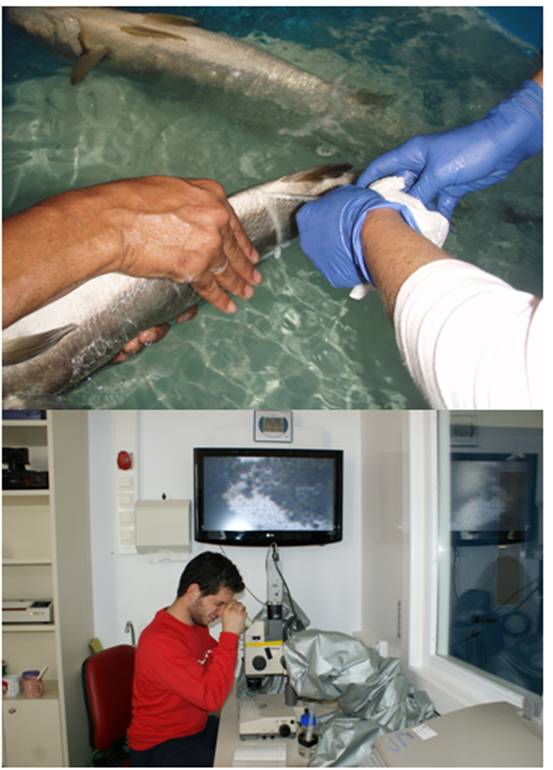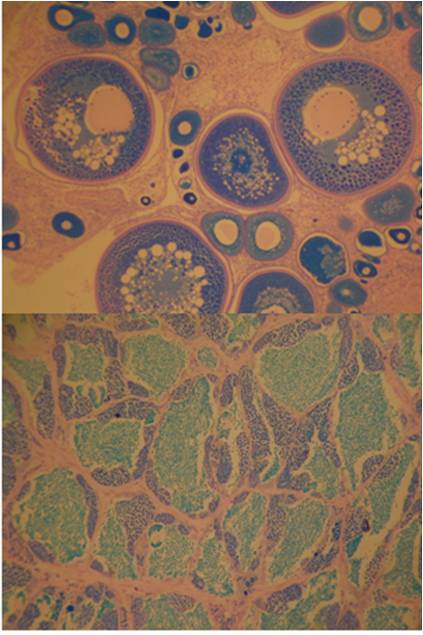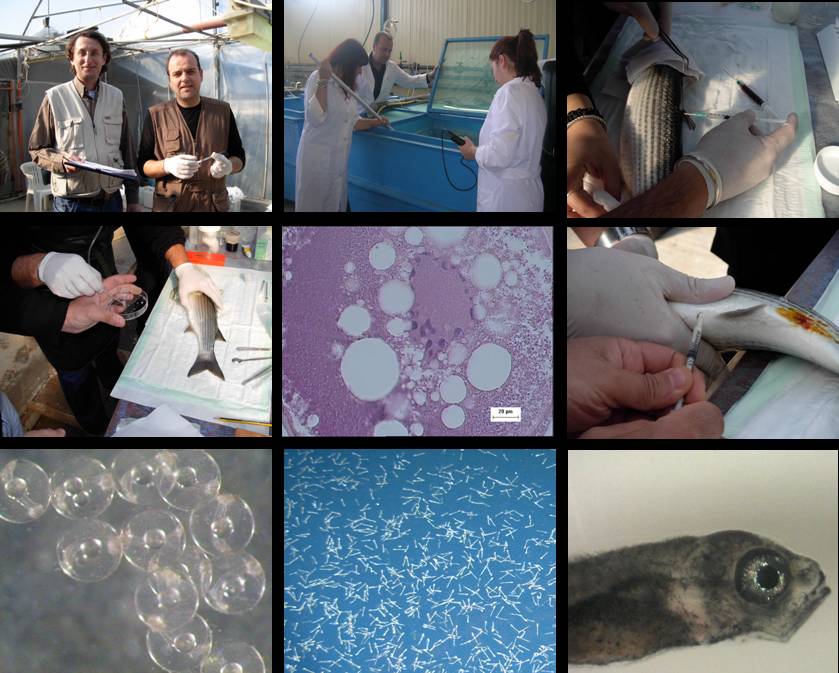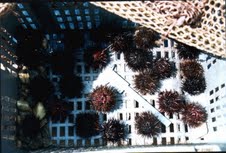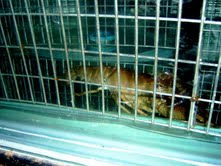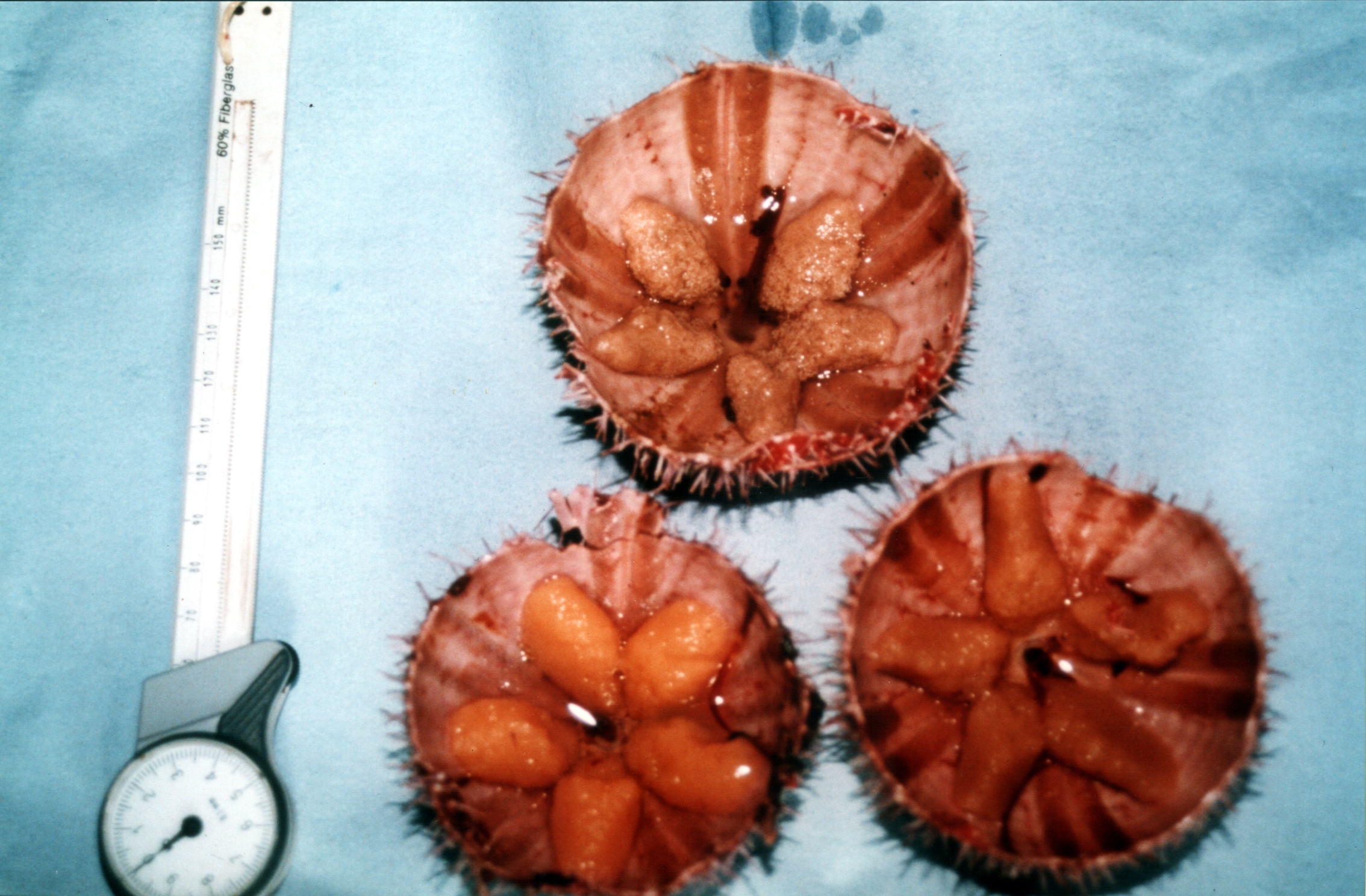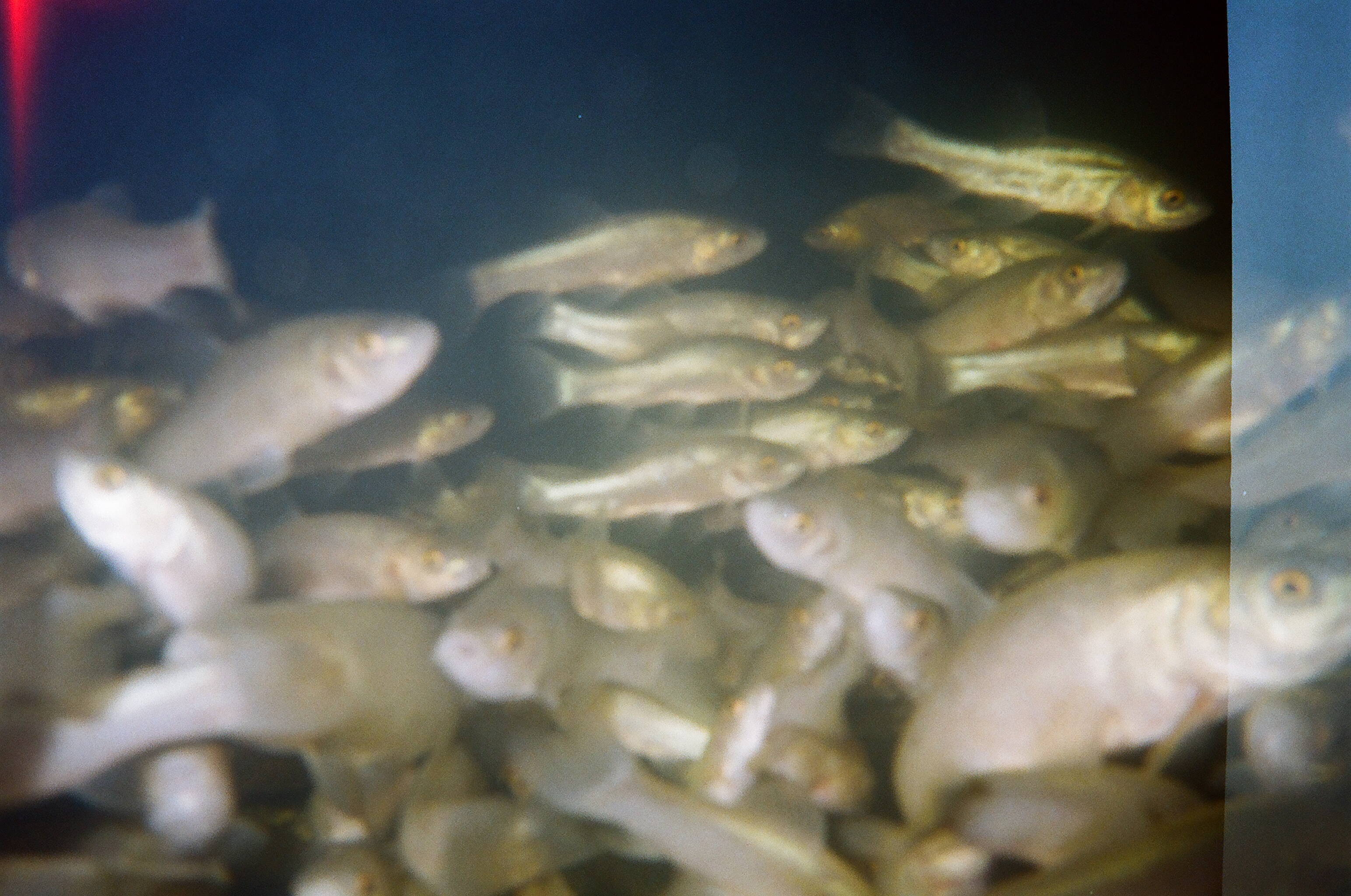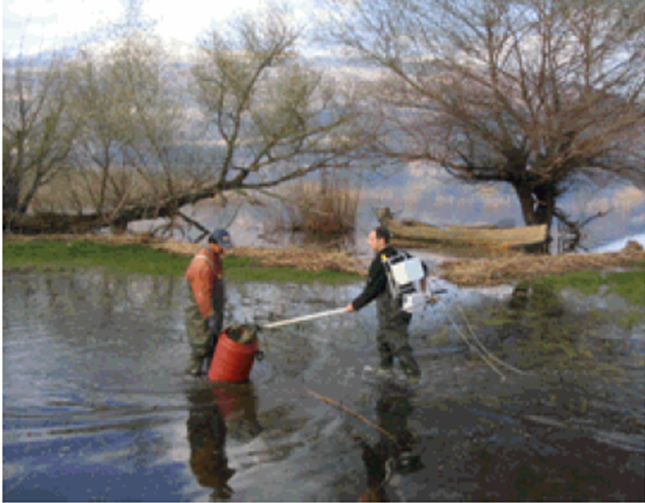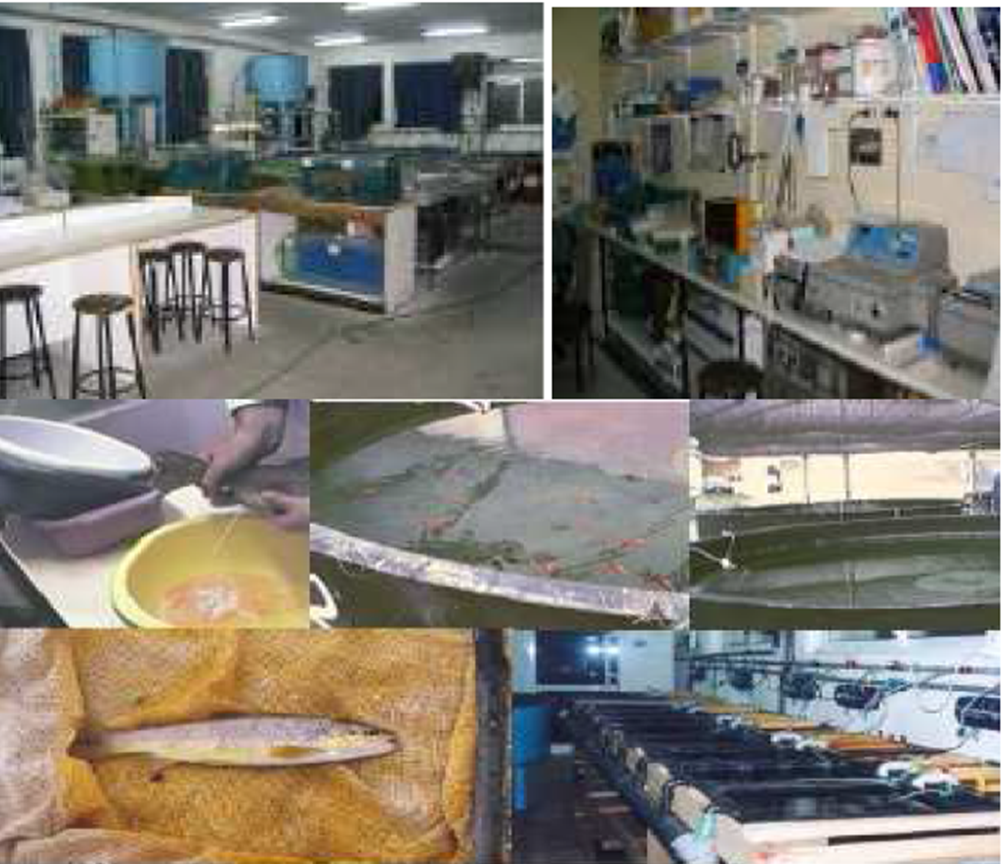Laboratory of Reproduction & Physiology (LRP-IMBBA)
Institute of Marine Biology, Biotechnology and Aquaculture
Hellenic Center for Marine Research
Contact
Dr. Constantinos C. Mylonas
mylonas@hcmr.gr
Phone +30 2810 337878
Address
Hellenic Center for Marine Research
P.O.Box 2214
Iraklion, Crete 71003
Greece
Group description
The LRP-IMBBA has been in operation since 1999 and is involved in the study of fish reproduction and broodstock management in a variety of marine species with interest for the Mediterranean aquaculture. The laboratory is lead by Dr. Constantinos C. Mylonas, and is staffed by two technicians. In addition to its research activities, the LRP-IMBBA is also involved in training of graduate students from all over Europe, as well as providing consulting services to the aquaculture industry in the area of broodstock management and hormonal induction of spawning.
Main lines of research
The research activities may be summarized in (a) the study of fish reproductive biology and endocrinology, (b) the identification of the dysfunctions exhibited by female and male broodstocks in captive conditions, and (c) the development of pharmacological methods for the control of reproduction, induction of spawning and improvement of sperm production in fish of interest for the aquaculture industry. Some of these species include the shi drum (Umbrina cirrosa), meager (Argyrosomus regius), dusky grouper (Epinephelus marginatus), wreckfish (Polyprion americanus), greater amberjack (Seriola dumerili) and Atlantic Bluefin tuna (Thunnus thynnus).
Links
http://innovator.ath.hcmr.gr for Hellenic Center for Marine Research.
http://fishrepro.weebly.com for Laboratory of Reproduction & Physiology.
http:// kranios.weebly.com for Project KRANIOS “Development of reproduction and culture methods for meagre (Argyrosomus regius) as a means to improve the competitiveness of the aquaculture industry through species diversification.
Relevant publications
1. Pavlides, M. and C.C. Mylonas (eds). 2011. Sparidae: Biology and Aquaculture. Wiley-Blackwell, Oxford, 390 pp.
2. Mylonas, C.C. and Y. Zohar. 2009. Controlling reproduction in aquaculture: new developments. In: Burnell, G. and Allan, G., (eds), New Technologies in Aquaculture: Improving Production, Quality and Environmental Management. CRC Press, Woodhead Publishing Limited, Cambridge, pp. 109-142.
3. Mylonas, C.C., Bridges, C., Gordin, H., Belmonte Ríos, A., García, A., De la Gándara, F., Fauvel, C., Suquet, M., Medina, A., Papadaki, M., Heinisch, G., De Metrio, G., Corriero, A., Vassallo-Agius, R., Guzmán, J.M., Mañanos, E. and Y. Zohar. 2007. Preparation and administration of gonadotropin-releasing hormone agonist (GnRHa) implants for the artificial control of reproductive maturation in captive-reared Atlantic bluefin tuna (Thunnus thynnus thynnus). Reviews in Fisheries Science 15: 183-210.
4. Mylonas, C.C., Corriero, A., De la Gándara, F., Belmonte Ríos, A., 2010. Atlantic bluefin tuna (Thunnus thynnus) farming and fattening in the Mediterranean Sea. Reviews in Fisheries Sciences 18: 266-280.
5. Mylonas, C.C., Fostier, A., Zanuy, S., 2010. Broodstock management and hormonal manipulations of reproduction. General and Comparative Endocrinology 165: 516-534.
6. Mylonas, C.C., Mitrizakis, N., Papadaki, M., Sigelaki, I., 2013. Reproduction of hatchery-produced meagre Argyrosomus regius in captivity I. Description of the annual reproductive cycle. Aquaculture 000: 000-000 (in press).
7. Mylonas, C.C., Mitrizakis, N., Castaldo, C., Cerviño, C., Papadaki, M., Sigelaki, I., 2013. Reproduction of hatchery-produced meagre Argyrosomus regius in captivity II. Hormonal induction of spawning and monitoring of spawning kinetics, egg prodcution and egg quality. Aquaculture 000: 000-000 (in press).
Laboratory of Aquaculture
Department of Fisheries Technology and Aquaculture
Alexander Technological Educational Institute of Thessaloniki
Contact
Dr. Lambros Kokokiris
lamprosk@aqua.teithe.gr
Phone: +30 2373 0 26457
Address
Department of Fisheries Technology and Aquaculture
P.O.Box 157, 63200, Nea Moudania, Chalkidiki, Greece
Group description
The Laboratory of Aquaculture is part of the Department of Fisheries Technology and Aquaculture (established in 2000) which is dedicated to higher education (with professional oriented bachelor) and to basic and applied research in aquaculture and fisheries, environmental sciences and marine biotechnology. The Laboratory of Aquaculture is involved in the study of fish reproductive biology in a variety of species with interest for marine and freshwater fisheries, aquaculture and conservation. The group is comprised by two academic staffs and currently by one technician and two graduate students.
Main lines of research
The research activity is oriented towards the hatchery production of various fish species and the description of reproductive life history traits for management of aquatic resources (coastal fisheries, conservations plans, restocking). The research activities may be summarized in: (a) the study of fish reproductive biology in natural populations and broodstocks, and (b) Broodstock husbandry, development of methods to control reproduction of aquatic organisms in captivity, gamete storage and handling. Some of the studied species include: the red porgy (Pagrus pagrus), the grey mullets (Mugil cephalus, Chelon labrosus, Liza haematocheilus), the red mullet (Mullus barbatus) and the European whitefish (Coregonus lavaretus).
Links
Department of Fisheries Technology and Aquaculture: http://www.aqua.teithe.gr/
Relevant publications
1. Minos G, Kokokiris L, Economides P (2010). Sexual maturity of the alien redlip mullet, Liza haematochellus (Temminck & Schlegel, 1845) in north Aegean Sea (Greece). Journal of Applied Ichthyology 26 (Suppl. 2): 96-101.
2. Kokokiris L, Stamoulis A, Monokroussos N, Doulgeraki A (2013). Oocytes development, maturity classification, maturity size and spawning season of the red mullet (Mullus barbatus). Journal of Applied Ichthyology doi: 10.1111/jai.12292.
Department of Aquaculture, Aquatic Fauna & Aquatic Animal Health
Faculty of Veterinary Medicine, University of Thessaly, Greece
Contact
Dr. P.Pantazis
ppantazis@vet.uth.gr
Phone: +30 24410 66000
Fax: +30 24410 66041
Address:
224 Trikalon Street, P.O.Box 199,
43100, Karditsa, Greece
Group description
The Department was established in 1988. In 2001 Prof. F. Athanassopoulou was elected as Associate Professor at the Faculty of Veterinary Medicine and Head of the Department of Aquaculture, Aquatic Fauna and Aquatic Animal Health. In 2006 Dr. P.Pantazis was elected as Lecturer at the respective Department and in 2007 was officially appointed as member of the staff of the Department.
The Department focuses on three main research activities:
* Management of the aquatic animal health, hygiene and quality of the final aquatic products and there effect on public health.
* Development and application of effective and innovative aquaculture techniques both in marine and freshwater environments.
* Monitoring of wild aquatic animal populations in natural and artificial water reservoirs, particularly in those located in the Thessaly County.
(1) As far as the first activity is concerned, the Department has developed research on the diseases of aquatic animals, both wild and cultured marine and freshwater species. There is also ongoing research on all aspects of parasitological diseases of cultured marine and freshwater fish (pathology, immunology, chemotherapy and control), on Noda-virus disease of marine fish, on the diseases of sturgeon and on the development of molecular techniques for application in the identification of microorganisms and in diagnostic tests. The Department and its staff are well known in the Mediterranean area for the experience in fish disease research and diagnostics, and particularly in the field of parasitological diseases.
(2) As far as the second activity is concerned and for the last five years the Department has investigated the optimum conditions for the culture of tench (Tinca tinca), carp (Cyprinus carpio) and freshwater crayfish (Astacus astacus) in recirculated systems. It has also demonstrated ongoing research in marine fish larvae and juveniles focusing mainly in improving their husbandry techniques and feeding protocols. There is also increasing interest for the culture of various bivalves (scallops, oysters) while it has also demonstrated considerable research activity in the culture of echinoderms (sea urchins). Recently the Department has collaborated in the AQUAEXCEL project (www.aquaexcel.eu) and concluded an experiment related to the Reproduction of Pikeperch (Sander Lucioperca L.)” (http://www.frov.jcu.cz/en/aktuality-2013/dr-panagiotis-pantazis-realize-an-experiment-at-the-ffpw-usb). Furthermore, the Department has established collaboration with the Department of Molecular Evolution, Gdansk University, Poland in order to develop biochemical methods used in separation of fish spermatozoa enzymes (Bilateral Educational Program of Greece – Poland 2013).
(3) As far as the third activity is concerned, the Department is investigating water quality parameters and the status of ichthyophauna at the artificial water reservoirs of Plastira and Smokovo. In addition the Department has established collaboration with the Department of Ecology, Faculty of Humanities and Natural Sciences, University of Prešov, Slovakia, exchanging know-how, methodology and experience in issues of freshwater fauna and flora management (Bilateral Educational Program of Greece – Slovakia 2012).
Links
University of Thessaly – Faculty of Veterinary Science: www.vet.uth.gr
Professor F. Athanassopoulou (Head of Department, DVM, MSc, PhD, MRCVS): http://www.vet.uth.gr/greek/CV-ATHANASSOPOULOU_Fotini.pdf
Dr. P.Pantazis (Lecturer): http://www.vet.uth.gr/english/CV-PANTAZIS_Panagiotis.pdf
Relevant publications
Pantazis, P.A., 2013. The potential of pikeperch (Sander Lucioperca L.) culture and other percids’ culture in Europe. 28th Annual Symposium of the Hellenic Society of Animal Production, Florina, Greece, 2-4 October 2013.
Fish eco-physiology group
Dept Aquaculture & Fisheries
TEI of EPIRUS, Igoumenitsa, Greece
Contact
Prof Cosmas Nathanailides
cosmasfax
Telephone: +30-2665049852
Fax: +30-2665049886
Address
Irinis & Filias 1
46100 Igoumenitsa, Greece
Group description
The laboratory of Fresh water aquaculture is running from 1999 inside Igoumenitsa Campus, as integral part of the Department of Aquaculture & Fisheries, Technological Educational Institute of Epirus. It is involved in both research and teaching activities concerning controlled reproduction and artificial insemination in fish, basic genetics, genetic engineering, anatomy and physiology of aquatic farmed species and fishing management of freshwaters. Moreover, newly developed controlled reproduction techniques and new candidate species are continuously tested and evaluated. Aspects of protection and restoration of threatened species are also of its major concern. The laboratory is actively participating in research programmes together with Universities, other Technological Educational Institutes and Research Institutes in Greece and Abroad (UK, Spain, Israel).
Main lines of research and potential contribution of the lab to the Aquagamete COST ACTION
The laboratory of Prof Nathanailides has been involved in research work on sperm freezing, fish reproduction and the quality of fish gametes, carried out in the Department of Aquaculture and Fisheries of the Technological Educational Institute of Epirus, for the past 12 years. The lab can collaborate with scientist how wish pursue research projects fro the development of protocols for the evaluation of sperm quality.
The lab could also help those who may need access to sperm samples of locally available bloodstocks of freshwater fish species (carp, trout) and for laboratory analysis of sperm quality. The laboratory is currently investigating practical laboratory methods including the use of hormones, for the production of quality gametes by captive fish. The laboratory of Fresh water aquaculture is equiped with Computer-assisted sperm analysis system (CASA) as a tool for monitoring sperm quality in fish.
Links
https://www.
http://scholar.google.gr/
Electrofishing, Kalamas river, NW Greece
A view of the Laboratory Teaching facilities
